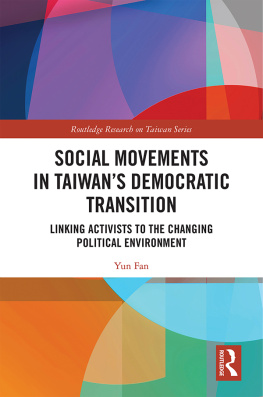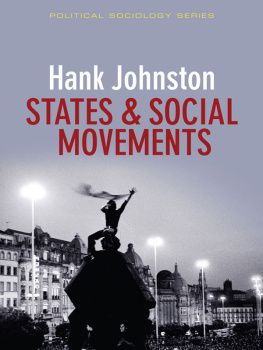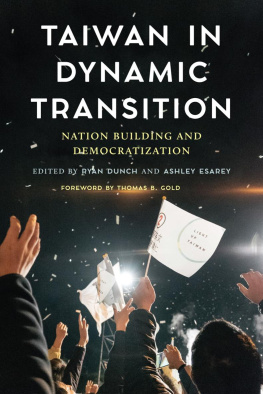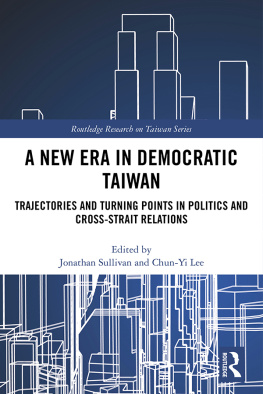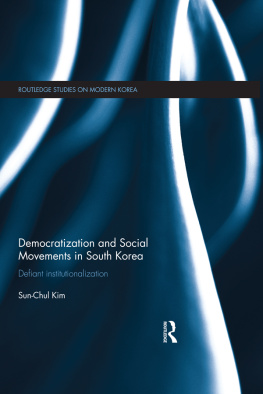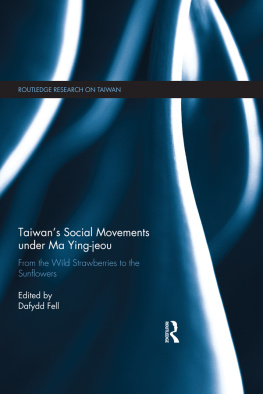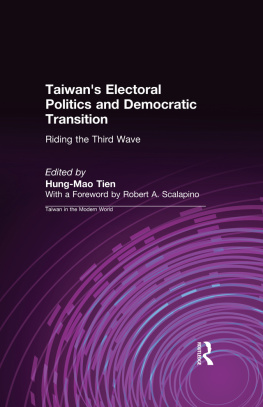Social Movements in Taiwans Democratic Transition
Examining the relationships between activists and the changing political environment, this book analyzes the trajectories of three major social movements in Taiwan during the countrys democratic transition between 1980 and 2000. In doing so, it explores why the labor and environmental movements became less partisan, while the womens movement became more so.
Providing a comparative discussion of these critical social movements, this book explores key theoretical questions and presents a rich and comprehensive analysis of social activism during this period of Taiwans political history. It focuses on causal mechanisms and variation and thus avoids the tautological trap of finding an improving political opportunity structure wherever a social movement is flourishing. Drawing on extensive data from over 140 activists demographic backgrounds, the discussion also builds upon existing studies of the biographical aspects of contention. This study then asks further questions about how certain tactics are chosen, not only how a repertoire of contention comes to have the shape it does.
Combining both a theoretical and an empirical approach, this book will be useful to students and scholars of Taiwanese politics and society, as well as social movements and democracy more generally.
Yun Fan is an Associate Professor of Sociology at National Taiwan University. Her research interests include social movements, civil society, and identity politics.
Routledge Research on Taiwan Series
Series Editor: Dafydd Fell, SOAS, UK
The Routledge Research on Taiwan Series seeks to publish quality research on all aspects of Taiwan studies. Taking an interdisciplinary approach, the books will cover topics such as politics, economic development, culture, society, anthropology, and history.
This new book series will include the best possible scholarship from the social sciences and the humanities, and welcomes submissions from established authors in the field as well as from younger authors. In addition to research monographs and edited volumes, general works or textbooks with a broader appeal will be considered.
The series is advised by an international Editorial Board and edited by Dafydd Fell of the Centre of Taiwan Studies at the School of Oriental and African Studies.
24 Connecting Taiwan
Participation Integration Impacts
Edited by Carsten Storm
25 Assessing the Presidency of Ma Ying-jiu in Taiwan
Hopeful Beginning, Hopeless End?
Edited by Andr Beckershoff and Gunter Schubert
26 A New Era in Democratic Taiwan
Trajectories and Turning Points in Politics and Cross-Strait Relations
Edited by Jonathan Sullivan and Chun-yi Lee
27 Social Movements in Taiwans Democratic Transition
Linking Activists to the Changing Political Environment
Yun Fan
For more information about this series, please visit: https://www.routledge.com/asianstudies/series/RRTAIWAN
Social Movements in Taiwans Democratic Transition
Linking Activists to the Changing Political Environment
Yun Fan
First published 2019
by Routledge
2 Park Square, Milton Park, Abingdon, Oxon OX14 4RN
and by Routledge
711 Third Avenue, New York, NY 10017
Routledge is an imprint of the Taylor & Francis Group, an informa business
2019 Yun Fan
The right of Yun Fan to be identified as author of this work has been asserted by her in accordance with sections 77 and 78 of the Copyright, Designs and Patents Act 1988.
All rights reserved. No part of this book may be reprinted or reproduced or utilised in any form or by any electronic, mechanical, or other means, now known or hereafter invented, including photocopying and recording, or in any information storage or retrieval system, without permission in writing from the publishers.
Trademark notice: Product or corporate names may be trademarks or registered trademarks, and are used only for identification and explanation without intent to infringe.
British Library Cataloguing-in-Publication Data
A catalogue record for this book is available from the British Library
Library of Congress Cataloging-in-Publication Data
A catalog record has been requested for this book
ISBN: 978-0-415-72072-4 (hbk)
ISBN: 978-1-315-86675-8 (ebk)
Typeset in Times New Roman
by codeMantra
Contents
I would like to extend my thanks to many people who made this book possible.
First, Frances Rosenbluth, my PhD advisor at Yale, was an inspiring model for me as a new teacher and read an earlier version of this book. I owe a great debt of gratitude to her for her intellectual guidance and unfailing support. I consider myself very lucky to have been taught by Juan Linz, Debra Minkoff, Debra Davis, Joshua Gamson, Kai Erikson, and Charles Perrow. My time at Yale taught me the power of a nurturing academic community. Zhao Dingxin and Wang Horng-luen read several chapters of the manuscript and provided me with critiques. My longtime co-author on several papers, Lo Mingcheng, has been very generous with her moral support.
I am very grateful to the Department of Sociology at National Taiwan University, my undergraduate alma mater. The congenial environment there makes it possible for me to take time out for writing each day in the midst of my teaching obligations and my activist engagement. My special thanks to Tseng Yen-fen, Wu Chia-ling, Lin Kuoming, and Chen Dung-sheng, who have all lent me their ears whenever I wanted to talk. Without Chen Dung-shengs encouragement 25 years ago as my thesis advisor, I might not have chosen to do my PhD abroad. Special thanks go to my current and former research assistants, Chang Li-Ning, Hsiao Ming-Yuei, Chang Wei-zon, Wu Yuei-Chang, Chang Yushing, Huang Yi-An, Liang Cheng, Cheng Hao-Chung, and Cheng Yu-Ting, for collecting data and checking references. All the students who took my seminar on social movements have helped to create a fertile site for thinking about social movements. Teaching them always reminds me what a privilege it is to educate young minds.
Routledge series editor Dafydd Fell of the School of Oriental and African Studies at the University of London persuaded me to publish this book. Many thanks to him, the reviewers, and Georgina Bishop at Routledge for their confidence and patience with me, and to my editor, Margaret Copeley, for her professional help in making this book easier to read. Thanks also to the National Science Foundation for funding.
The subject of this book is both academic and personal for me. As a student movement activist beginning in my undergraduate years, I witnessed the pivotal role played by activists in Taiwans changing political environment. My direct experiences with activism are what made me want to know more than what I found in the social movement literature. I am thankful for the willingness of the activists I interviewed to share with me their disputes, bafflement, disillusionment, and joys of participating in movements. Without them, this book would not have been possible. More importantly, without them, the road to Taiwans democracy would have been very different. I thank them for their devotion to making Taiwan a better place to live in.

